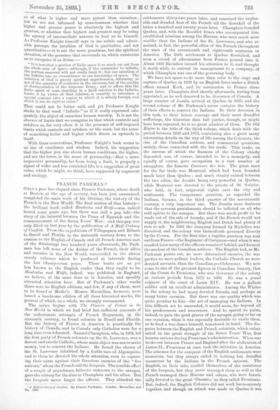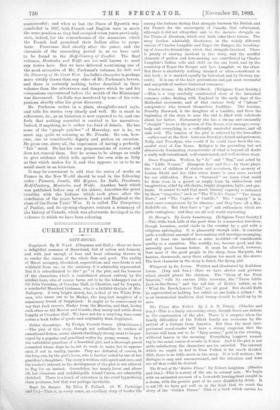FRANCIS PARKMAN.*
ONLY a year has elapsed since Francis Parkman, whose death at Boston, at the age of seventy, has been just announced, completed the main work of his lifetime, the history of the French in the New World. The final section of that history— the brilliant book called Piontealm and Wolfe—was indeed issued some years ago, but there was still a gap left—the story of the interval between the Peace of Ryswick and the commencement of the Seven Years' War ; and this gap was only filled up last year by the publication of A Half Century of Conflict. From the expeditions of Villegagnon and Ribaut to Brazil and Florida in the sixteenth century down to the cession to the English of Canada and all French America east of the Mississippi two hundred years afterwards, Mr. Park- man has left none of the doiiigs of the French, their allies and enemies in the New World, unrecorded in the eleven sturdy volumes which he produced at intervals during the last twenty-seven years. These books are as yet less known to the English reader than they ought to be. Montealm and Wolfe, indeed, was published in England, we believe, at the same time as in America, and speedily attracted attention here. But of Parkman's other works there were no English editions, and few, if any of them, were to be found at Mudie's. Messrs. Macmillan, however, soon issued a handsome edition of all these historical works, the perusal of which, as a whole, we strongly recommend.
The series begins with The Pioneers of France in the New World in which we find brief but sufficient accounts of the unfortunate attempts of French Huguenots, in the sixteenth century, to found colonies in Brazil and Florida. But the history of France in America is practically the history of Canada, and in Canada only Catholics were for a long time even tolerated. Samuel Champlain, who, in 1604, led the first party of French colonists up the St. Lawrence, was a devout and ascetic Catholic, whose main object was not to make money, but to convert the Indians. He found the shores of the St. Lawrence inhabited by a feeble race of Algonquins, and to them he devoted his whole attention, even to espous- ing their cause •against their ferocious enemies of the " five nations," whom the French call the Iroquois. The terrible effect of a couple of arquebuses, hitherto unknown to the savages, gave the victory for the time to Champlain and his allies. But the Iroquois never forgot the affront. They attacked the "A lialf•Century of Confliat. By Franois Parkman. London: Macmillan and Co. 1892. settlements thirty-two years later, and remained the implac- able and dreaded foes of the French till the downfall of the latter a hundred and twenty years later. Champlain founded Quebec, and, with the Recollet friars who accompanied him, established missions among the Hurons, who were much more warlike than the Indians of the St. Lawrence, and who re- mained, in fact, the powerful allies of the French throughout the wars of the seventeenth and eighteenth centuries in America. The little settlement at Quebec flourished, and soon a crowd of adventurers from France poured into it. About 1626 Richelieu turned his attention to it, and thought it worth while to entrust its management to a company, of which Champlain was one of the governing body.
We have not space to do more than refer to the siege and capture of Quebec in 1629 by an English force under a Dutch officer named Kerk, and its restoration to France three years later. Champlain died shortly afterwards, having been appointed, as he well deserved to be, Governor of Canada. A large number of Jesuits arrived at Quebec in 1625, and the second volume of Mr. Parkman's series contains the history of their efforts to convert the Indians. To their devotion in this task, to their heroic courage and their most dreadful sufferings, the historian does full justice, though, as might have been expected, he is no great admirer of them. The Old .Regimc is the title of the third volume, which deals with the period between 1649 and 1672, containing also a great many interesting details on the way of life among the Colonists, the rise of the Canadian noblesse, and commercial questions, mainly, those connected with the fur trade. This trade, on the success of which the finances of the Colony chiefly depended, was, of course, intended to be a monopoly, and equally of course, gave occupation to a vast number of smugglers, the famous Coureurs des bois. The great mart for the fur trade was Montreal, which had been founded much later than Quebec ; and much rivalry existed between the two cities, the Jesuits being very powerful in Quebec, while Montreal was devoted to the priests of St. Sulpice, who held, in fact, seignorial rights over the city and settlement. The temperance question, as regarded the Indians, became, in the third quarter of the seventeenth century, a very important one. The Jesuits were desirous that the severest punishments should be inflicted on all who sold spirits to the savages. But there was much profit to be made out of the sale of brandy, and if the French would not supply it, the neighbouring English and Dutch had plenty of rum to sell. In 1662 the company formed by Richelieu was dissolved, and the colony was thenceforth governed directly by the Crown. For the first time a regular garrison was sent out from France—the Regiment of Carignan—and when it was recalled later many of the officers remained behind, and formed the nucleus of the Canadian noblesse. The English had, as Mr. Parkman points out, no more determined enemies, the war parties no more gallant leaders, the Catholic Church no more devoted servants, than the Canadian gentilshommes. We now come to one of the greatest figures in Canadian history, that of the Count de Frontenac, who was Governor of the colony at various periods from 1672 to 1698. He was a grand seigneur of the court of Louis XIV. He was a gallant soldier and an excellent administrator. Among the Whites in the colony he had many devoted friends, and perhaps as many bitter enemies. But there was one quality which was quite peculiar to him—the art of managing the Indians. In this difficult art he succeeded, it would seem, far beyond all his predecessors and successors. And he spared no pains, indeed, to gain the good graces of the savages, going so far on one occasion, when it was especially desirable to excite them, as to lead a war-dance himself, tomahawk in band. The dis-
putes between the English and French colonists, which culmi- nated in the great struggle of the Seven Years' War, first became serious during Frontenac's administration. When war broke out between France and England after the abdication of James II., Frontenac at once took the initiative in America.
The schemes for the conquest of the English settlements were numerous, but they always ended in nothing but dreadful massacres by the Indians in the French interest. The
English, on their side, availed themselves of the assistance of the Iroquois, but they never managed them so well as the French managed their Hurons and others, who were fanati-
cally devoted to the great OnOntio,' as they called Frontenac. But, indeed, the English Colonies did not work harmoniously together, and though an attack was made on Quebec it was unsuccessful ; and when at last the Peace of Ryswick was concluded in 1697, both French and English were in much the same position as they bad occupied seven years previously, save, indeed, for the remembrance of the massacres which the French had permitted their Indian allies to perpe- trate. Frontenac died shortly after the peace, and the chronicle of the succeeding period is, as we have said, to be found in the Half Century of Conflict. The final volumes, Montealm and Wolfe are too well known to need any notice here. But we have deferred mentioning one of the most attractive of Mr. Parkman's volumes, La Salle and the Discovery of the Great West. La Salle's character is perhaps more vividly drawn than any other of Mr. Parkman's heroes, and there is certainly nothing better described in these volumes than the adventures and dangers which he and his 'companions encountered before the mouth of the Mississippi was discovered. La Salle was murdered by some of his com- panions shortly after his great discovery.
Mr. Parkman writes in a plain, straightforward style, and tells his stories very clearly and well. He is exact in 'references, &c., as an historian is now expected to be, and one feels that nothing essential is omitted in his narratives. Indeed, if anything, he is rather too fond of details. He has none of the "purple patches" of Macaulay, nor is he, we must say, quite so amusing as Mr. Froude. He can, how- ever, rise to considerable dignity and pathos on occasion. He gives one, above all, the impression of having a perfectly " fair " mind. He has his own prepossessions of course, and does not conceal them. But he seems to be always as ready to give evidence which tells against his own side as fully as that which makes for it, and this appears to us to be no 'small merit in an historian.
It may be convenient to add that the series of works on France in the New World should be read in the following -order : Pioneers, Jesuits, Old Bilime, La Salle, Frontenac, Half-Century, Montcalm, and Wolfe. Another book which was published before any of his others, describes the great 'troubles with the Indians which took place after the conclusion of the peace between France and England at the close of the Seven Years' War. It is called The Conspiracy .of Pontiac, and its opening chapters contain a summary of the history of Canada, which was afterwards developed in the volumes to which we have been referring.







































 Previous page
Previous page